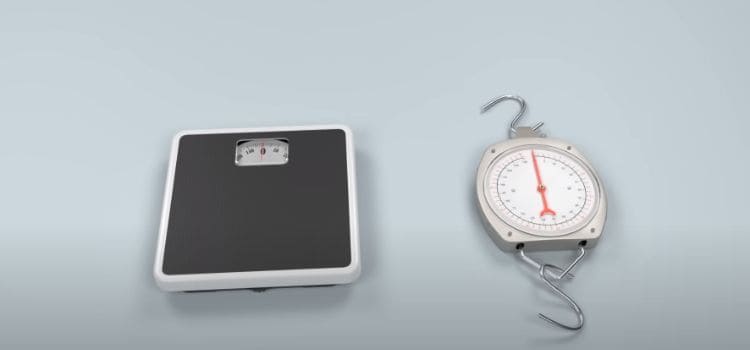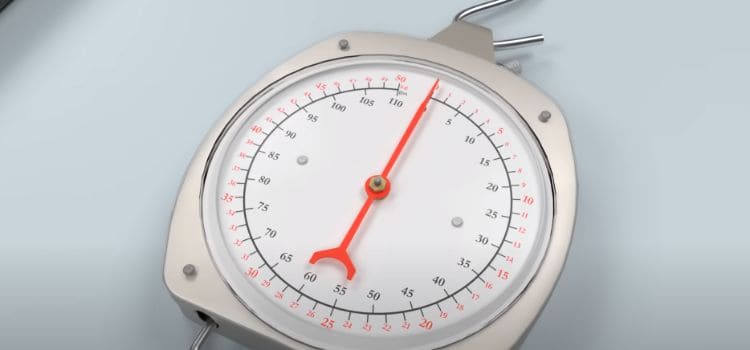As an Amazon Associate, I earn from qualifying purchases

When it comes to choosing between a mechanical scale and a digital scale, there are a few factors to consider. The ultimate choice hinges on your requirements and preferences. It’s essential for everyone to bear in mind that when it comes to weighing scales, there are two primary variants: mechanical and digital scales.
Mechanical scales are recognized for their straightforwardness and robustness. They typically have a simple dial or needle that shows the weight, and they don’t require batteries or electricity to operate.
Mechanical Scales and Digital Scales make them a reliable option, especially in situations where power sources may be limited or unreliable. Mechanical scales often offer a more budget-friendly option in comparison to their digital counterparts.
Digital scales offer a range of additional features and conveniences. They employ electronic sensors for weight measurement and usually present the results on a digital screen. Digital scales are celebrated for their accuracy and precision, frequently measuring weight to the decimal point.
Mechanical vs. Digital Scale: Which One is Superior?

Mechanical scales, also known as analog scales, have been around for a long time and are a more traditional option. They typically use a spring mechanism to measure weight and have a dial or needle that displays the results. These scales are generally reliable and durable, and they don’t require batteries or electricity to function.
However, they may exhibit less precision than digital scales and might require occasional calibration.
Renowned for their precision and accuracy, they frequently measure weight down to the decimal point. Digital scales often have additional features like memory storage, BMI calculations, and weight tracking capabilities. Nonetheless, they necessitate batteries or electricity for operation, and certain models might be susceptible to fragility or malfunctions.
To ascertain which scale type is more suitable for you, take into account your specific requirements.
If precision and accuracy are your priorities, opting for a digital scale might be the preferable decision. If you prefer a more traditional and durable option, a mechanical scale could be the right fit.
Considering any additional features or functionalities that you may find advantageous is also worth your while.
Mechanical Scales versus Digital Scales Comparison–2024
Product Name | Brand | Color | Weight Limit | Material | Price |
Stainless Steel Mechanical Scale-with Stainless Steel Platform | TADA | Silver | 44 Pounds | Stainless Steel | |
Scale for Body Weight-Scale in Black | Conair | Black | 330 Pounds | Metal | |
A25 Scales for Body Weight - Up to 400 LB-Mechanical Weight Scale | Adamson | Black | 400 Pounds | Rubber | |
Digital Kitchen Scale with LCD Display | Amazon Basics | Black and Stainless Steel | 11 Pounds | Stainless Steel | |
Smart Scale for Body Weight, Digital Bathroom Scale | RENPHO | Black | 400 Pounds | Glass |
Mechanical scales operate by utilizing a mechanism of springs and levers to gauge weight. These scales have a long history of use and continue to be favored today because of their loyalty.
Digital Scale(Mechanical Scales versus Digital Scales)

A digital scale, on the other hand, utilizes electronic sensors and a digital display to provide weight measurements. These scales are known for their ease of use and convenience, as they typically have a larger, easy-to-read display and may include additional features such as automatic shut-off or memory functions. Digital scales are also often more portable and compact compared to mechanical scales.
Ease of Operation(Mechanical Scales versus Digital Scales)
Mechanical scales are known for their simplicity and straightforward operation. They typically have a dial or pointer that indicates the weight, and you simply read the measurement off the scale. However, they may require some manual adjustments or calibration to ensure accurate readings.
Digital scales are crafted for user-friendly operation. Many digital scales also have additional features such as automatic shut-off or memory functions, which can make weighing tasks more convenient. Digital scales often come with touch buttons or a keypad for easy input, allowing you to quickly switch between different weighing units or access other functions.
Mechanical Scales versus Digital Scales(Cost)

It is important to note that the cost can vary depending on the brand, quality, and additional features of the scale. Digital scales generally have a higher price point due to their advanced technology and added convenience. They often offer more precision and accuracy in measurements, which can be beneficial in certain industries or for individuals who require precise weighing. It is important to assess your needs and budget before making a decision on which type of scale to purchase. Keep in mind that investing in a high-quality scale, whether mechanical or digital, can prevent future costs associated with inaccurate measurements or frequent replacements.
Reliability
They are designed to provide consistent and precise readings, ensuring that you can rely on the measurements for your business or personal use. Additionally, digital scales often come with features such as automatic shut-off or memory functions, which add to their convenience and reliability. These features ensure that the scale is user-friendly and can remember previous measurements or save energy by automatically turning it off when not in use.
When evaluating costs, it’s crucial to factor in the brand, quality, and supplementary features of a digital scale. These elements can influence the price, as digital scales typically command a higher cost owing to their sophisticated technology and enhanced convenience. Nevertheless, opting for a premium digital scale can mitigate potential expenses linked to inaccurate readings or frequent replacements in the long run.
It is crucial to assess your needs and budget before making a decision on which type of scale to purchase. Remember that reliability should be a top consideration when selecting a digital scale, as it is essential to have accurate and consistent measurements for your business or personal use.
Accuracy

When choosing a digital scale, prioritizing reliability is paramount. Accurate and consistent measurements are crucial for various applications, including cooking, portion control, and product manufacturing. Opting for a dependable digital scale guarantees precise measurements, thereby enhancing the effectiveness of your business or personal pursuits.
Digital scales are often preferred over traditional analog scales due to their higher accuracy and precision. Digital scales use advanced technology such as load cells and strain gauges to provide accurate measurements.
Portability
This proves particularly advantageous for individuals or businesses with frequent travel requirements or constrained space. Furthermore, portable digital scales frequently offer features like battery-powered operation or USB charging, enhancing their convenience and versatility.
When considering a digital scale, it is important to prioritize portability and reliability. Portable options offer convenience and ease of use, while a reliable digital scale provides accurate and consistent measurements crucial for various applications. By investing in a high-quality digital scale, you can ensure accurate measurements that will contribute to the success of your business or personal endeavors.
Calibration

It involves adjusting the scale to ensure accurate and precise measurements. Calibration is necessary because factors such as temperature changes, environmental conditions, and regular wear and tear can affect the accuracy of the scale over time.
To calibrate a digital scale, you will typically need to follow the instructions provided by the manufacturer. This may involve using specific weights or performing certain procedures to ensure that the scale is properly calibrated.
Regular calibration is recommended to maintain the accuracy of the digital scale. The frequency of calibration varies depending on factors like the scale type, usage frequency, and industry/application. Calibration might necessitate daily or weekly intervals in certain scenarios, whereas monthly or even less frequent calibration could suffice in others. less frequently.
If you are unsure about how to calibrate your digital scale or if you are experiencing any issues with its accuracy, it is recommended to consult the manufacturer’s instructions or seek assistance from a professional technician. They can provide assistance with suitable calibration techniques, guaranteeing optimal performance of your scale.
Functionality
If you are unsure about how to calibrate your digital scale or if you are experiencing any issues with its accuracy, it is recommended to consult the manufacturer’s instructions or seek assistance from a professional technician. They have the expertise to guide you through the proper calibration techniques and address any concerns you may have. By ensuring the optimal functionality of your digital scale, you can rely on accurate measurements and enhance the effectiveness of your weighing processes.
Durability

By taking these steps to care for your digital scale, you can ensure its durability and longevity. Remember, investing in a high-quality and reliable digital scale can save you time and money in the long run.
Which One Should You Choose?
Mechanical scales have been around for a long time and are known for their durability. They rely on springs and levers to measure weight and typically do not require any batteries or electricity to function. On the other hand, digital scales are more modern and offer a range of features and functionalities. They use electronic sensors to measure weight and often come with additional features such as tare functions, memory storage, and easy-to-read digital displays.
One advantage of mechanical scales is their simplicity. However, they may be less accurate than digital scales, as they can be affected by factors such as spring fatigue or gravity variations. Digital scales, on the other hand, are generally more precise and offer greater accuracy. They are also usually easier to read, with clear digital displays that provide immediate weight readings.
Another consideration is the scale’s intended use. Mechanical scales are often more suitable for heavy-duty applications, such as industrial weighing or weighing large objects. They are known for their robustness and ability to withstand harsh conditions. Digital scales, on the other hand, are often preferred for personal or household use due to their ease of use and accuracy.
In terms of maintenance, both types of scales require some level of care. Mechanical scales may need occasional calibration to ensure accuracy, while digital scales may require battery replacements or periodic recalibration. It is important to refer to the manufacturer’s instructions for proper maintenance guidelines.
Consider factors such as accuracy, ease of use, intended use, and maintenance requirements before making a decision. Reading reviews or seeking endorsement from professionals or seasoned users can also be beneficial.
As an Amazon Associate, I earn from qualifying purchases

